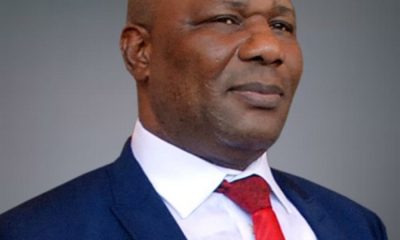BUSINESS
Oil Prices Soaring to $100 as Bonny Light Sells for $95pb

By Joseph Amah, Abuja
Oil prices continued their surge yesterday, sending one of Nigeria’s most valued grades, Bonny Light to $95 and Algeria’s Sahara Blend to $97.48, in an obvious push towards the $100 mark. The increase represented a 3.70 per cent for the Nigerian grade and 4.
29 per cent for the North African grade, the highest level they have attained since 2014.
Other grades of Nigeria’s oil, which experienced a significant rise were the Brass River, which was selling for $94.
This is happening for the first time since October 2014 due to ongoing supply worries and as frigid weather cascades across the US. The latest rally was attributed to growing concerns that extended cold weather could hit production in the US, exacerbating the tightness in world crude markets. The market was also watching developments between Russia and the West over the former’s aggressive posture towards Ukraine.
Crude benchmarks have been pointing upward for weeks on expectations that supply would tighten further even after the Organisation of Petroleum Exporting Countries and other producers (OPEC+) stuck to planned moderate output increases. Demand remains on the upswing, with the Omicron coronavirus variant only temporarily denting consumption in major economies in recent times.
OPEC and allies led by Russia, known as OPEC+, during the week agreed to stick to a monthly increase of 400,000 barrels per day (bpd) in output despite pressure from consumers to raise supplies more quickly.
In addition, Goldman Sachs has forecast Brent topping $100 a barrel in the third quarter, but that might come even earlier though insinuations are rife that OPEC+ may consider a faster unwinding of its production cuts. Several OPEC members, like Nigeria, are struggling to pump more despite prices being at seven-year highs, with the country unable to meet expected levels due to sabotage, waning upstream infrastructure and outright theft.
Nigeria was unable to meet its oil production allocation by OPEC in January, as it was only able to pump 1.46 million barrels per day of the expected 1.683 million bpd for the month. Moreover, the Group Managing Director, Nigerian National Petroleum Company (NNPC), Mr Mele Kyari, had said that NNPC’s joint venture partners were unable to restart oil wells shut down in the heat of the COVID-19 pandemic. His promise of a 1.8 million barrels target by December 2021 had earlier faltered.
The surge in the price of Bonny Light indicates that Nigeria now has as much as $33 above the $62 per barrel 2022 budget benchmark. The budget was based on the production of 1.8 million barrels per day, including about 400,000 barrels of condensate that Nigeria produces daily.
Ironically, Nigeria’s external reserve at the weekend fell below the $40 billion thresholds it had maintained in over three months. This was according to data from the Central Bank of Nigeria (CBN).The reserve had endured a continuous decline in recent months, owing to the intervention of the apex bank in the official FX market and sustained forex crunch in the economy.
Notably, the reserve level had fallen to $39.98 billion as of Thursday, February 3, 2022.Despite the rising oil prices, the country’s excess crude account had been depleted, while the foreign reserve dipped by $481.4 million in January 2022, following a $66.17 million decline recorded in December 2021.The federal government had explained recently that the fund depleted from $72.4 million to $35milion in a space of one year, despite crude oil averaging higher than Nigeria’s benchmark for the year.
BUSINESS
Electricity Supply Better off before Privatization – Consumers

Torough David, Abuja
Many electricity consumers in the Federal Capital Territory (FCT), said that electricity was more regular when it was being managed by the Federal Government.
The consumers, who reside in Kubwa, Kuje, Lugbe and Gwagwalada spoke in Abuja on Wednesday.
They said that the privatisation of the power sector was a good idea, but added that it was not working as they enjoyed more hours of supply when it was managed by Power Holding Company of Nigeria, (PHCN).
Privatization of the sector in November 2013, was an initiative of the Federal Government to transfer ownership and management of power assets to private entities.
The move was to improve efficiency, attract more investments, and enhance overall electricity supply.
Eleven Electricity Distribution Companies (DisCos) and six Generation Companies (GenCos) were formed after the sector was privatised.
However, the transmission arm of the sector was retained by the Federal Government.
The consumers said that electricity was more regular when it was managed by the government before privatisation of the sector.
Benjamin Okorie, a Civil Servant residing in Kubwa said that his area does not enjoy power supply for six hours in a day.
Okorie said that when PHCN was managing the power industry before the unbundling of the sector, it was stable and regular.
“I thought the unbundling of the sector into generation, transmission and distribution was to improve power supply.
“But from what we are experiencing now, it is getting worse by the day and we are paying more for electricity,’’ he said.
Maria Manza, a businesswoman also residing in Kubwa said that power supply was epileptic in her area.
Manza said that the area had been experiencing low shedding of power for more than three months, adding that some days they don’t even get supply.
Jonathan Onoja, resident in Lugbe, Federal Housing said that power supply was not regular in his area, adding that they hardly enjoy up to eight hours supply in a day.
According to him, with the privatisation of the power industry into three segments, I thought electricity will improve.
“With the privatisation of the power sector, I thought government was doing consumers a huge favour but to my greatest surprise electricity has not improved,’’ he said.
Julius Omogiafor, a businessman residing in Gwagwalada said that electricity was better off under government management.
Omogiafor said that when PHCN was in charge of power, it was more regular than when it is now managed by three bodies.
| ReplyReply allForwardAdd reaction |
BUSINESS
Small Business Owners Lament High Cost of Doing Business

Some business owners in the Federal capital Territory (FCT), have expressed concern over the high cost of doing business presently.
According to them, they are also experiencing low patronage as many residents can no longer pay for goods and services like before.
The business owners said on Wednesday in Abuja, that the cost of doing business was making life extremely difficult for them.
They said increased transportation, cost of living, inflation, and weakened purchasing power were some of the challenges affecting their businesses.
At the Apo Fish Market, Agnes Nwafor, a foodstuff dealer, said the current economic situation had dampened the usual weekend buzz.
“People who usually come to my shop to do bulk purchases no longer do that anymore. People now buy goods per time depending on their needs.
”So many others who come around enquire about the prices of the items and end up not picking anything,” she said.
Sani Abdul, a vegetable seller at the Apo market said he had cultivated the attitude of selling almost below his cost price just to turn-over and attract more customers.
He lamented that most of his customers now purchased things on credit paying up in two or three installments depending on the amount.
”With the low influx of customers to the market today, one will think that this is not even weekend.
“Some of my co-traders in the market sell a dust bin basket of tomatoes for between N10,000 and N12,000 but I sell for N9,500, just to attract customers.
“Most customers who come to the shop either want the price of the items slashed or want to buy the product on credit and I do not blame them,” he said.
He urged the government to come to the aid of citizens and find a lasting solution to the increasing cost of doing business in the country.
Ekaite Obong, who runs a restaurant at the Gudu market area, also decried high cost of doing business and poor sales.
Obong said:” it seems like the sales keep dropping every day, every week and every month. We are not making sales anymore due to high cost of products.
”Purchasing some food items now is like acquiring gold. Even items which the price ordinarily is supposed to decrease due to its season of cultivation have not declined.
“Thus, making the cost of food high, because we have infused a little profit to our sales. So I do not blame the customers who don’t turn out in mass at all.”
Obong urged the government to tackle inflation and strengthen the naira to reduce the cost of imported goods.
“We also need policies that help local farmers and producers too. If food items are affordable, cost of food will reduce and I am sure we will get more patronage,” she said.
Similarly, Chinedu Umeh, who runs a fabric store said the situation in the country had affected both his wholesale and retail business.
“The economy is biting hard, cost of transportation is killing our businesses. The government really needs to look into this area and find a lasting solution,” he said.
Umeh suggested tax relief for small businesses and better access to credit financing to help cushion the impact of reduced sales.
“Small businesses are the engine of the economy, but we are sinking. Government must listen to us, and come to our aid,” he said.
Owoicho Ameh, who owns a farm along airport road, also decried the high cost of doing business and low sales.
Ameh said: “it is no longer business as usual for us these days as the cost of chicken feed, electricity and even transport is challenging our business.
“We struggle with these factors even with our little resources, yet, at the point of sale, customers are either not willing or able to buy.
“This is because, when we factor in our cost of production, it leads to increased cost of the birds, making many customers not able to afford it.”
Ameh said on several occasions, he sold his birds at giveaway prices, just to make sales and get funds to take care of family responsibilities.
He lamented that if he continued in that manner, he may likely go out of business in the nearest future and become jobless.
“The government sincerely needs to take urgent steps to improve the economic climate, improve infrastructure and boost the people’s confidence.
“If this is not given immediate attention, the rate of suicides is bound to increase in the country and the number of jobless citizens will increase,” Ameh said.
BUSINESS
FG Inaugurates CNG Buses to Boost Staff Welfare

The Federal Government has reiterated its commitment to institutional performance and staff welfare with the inauguration of Compressed Natural Gas (CNG) buses at the Federal Ministry of Finance in Abuja
This was contained in a statement by the Director, Information and Public Relations of the ministry, Mohammed Manga.
Meanwhile, the Minister of Finance and Coordinating Minister of the Economy, Wale Edun, while inaugurating the buses, announced the reintroduction of essential provisions for the staff.
Edun described the move as part of a broader push to energise the ministry’s workforce and improve operational efficiency.
He said that the ministry’s internal strength was vital to delivering Nigeria’s broader economic reform agenda.
“This ministry is the engine room of national transformation and that engine must be well-fuelled,’’ he said.
He said that the buses were acquired under the presidential initiative on CNG, which intends to ease staff transportation while advancing the country’s shift to cleaner, cheaper energy sources.
The minister said that the initiative aligned with the ministry’s values of fiscal prudence, transparency and environmental responsibility.
Edun underscored the critical role of staff welfare in delivering Nigeria’s economic reform agenda.
He announced the revival of monthly welfare provisions to staff, a practical gesture aimed at fostering morale and stability as the ministry leads the charge on macroeconomic reform.
The Permanent Secretary of the Ministry, Lydia Jafiya, urged the staff to remain committed, disciplined and professional as the ministry continues to steer the country through a period of economic transition.
“As the country pursues tough but necessary policy shifts ranging from treasury digitalisation to market stabilisation, the ministry’s internal unity and external credibility remain pivotal to achieving inclusive growth and restoring investor confidence,” she said.
Jafiya also commended the minister’s leadership and hard work.
The Chairman of the Presidential Initiative on CNG, Ismaeel Ahmed, reiterated the programme’s mission to mainstream cleaner transport across government institutions and stimulate local industrial value chains.
| ReplyReply allForwardAdd reaction |


















